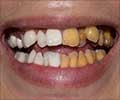A tooth lodged in a thigh bone of a giant ancient reptile has been discovered by scientists.

Stephanie Drumheller, an earth and planetary sciences lecturer, and her Virginia Tech colleagues Michelle Stocker and Sterling Nesbitt examined 220-million-year-old bite marks in the thigh bones of an old reptile and found evidence that two predators at the top of their respective food chains interacted, with the smaller potentially having eaten the larger animal.
A tooth of a semi-aquatic phytosaur lodged in the thigh bone of a terrestrial rauisuchid, lay broken off and buried about two inches deep in bone and healed over, indicating that the rauisuchid, a creature about 25 feet long and 4 feet high at the hip, survived the initial attack.
To study the tooth without destroying the bone, the team partnered computed tomographic (CT) data with a 3D printer and printed copies of the tooth. This, along with an examination of the bite marks, revealed a story of multiple struggles. The team found tissue surrounding bite marks illustrating that the rauisuchid was attacked twice and survived. Evidence of crushing, impact and flesh-stripping but no healing showed the team that the animal later died in another attack.
The tooth that was left behind revealed who was guilty of the attacks.
The findings also suggested that previous distinctions between water- and land-based food chains of this time, the Late Triassic Period, might be built upon mistaken assumptions made from fossil remains.
Advertisement








